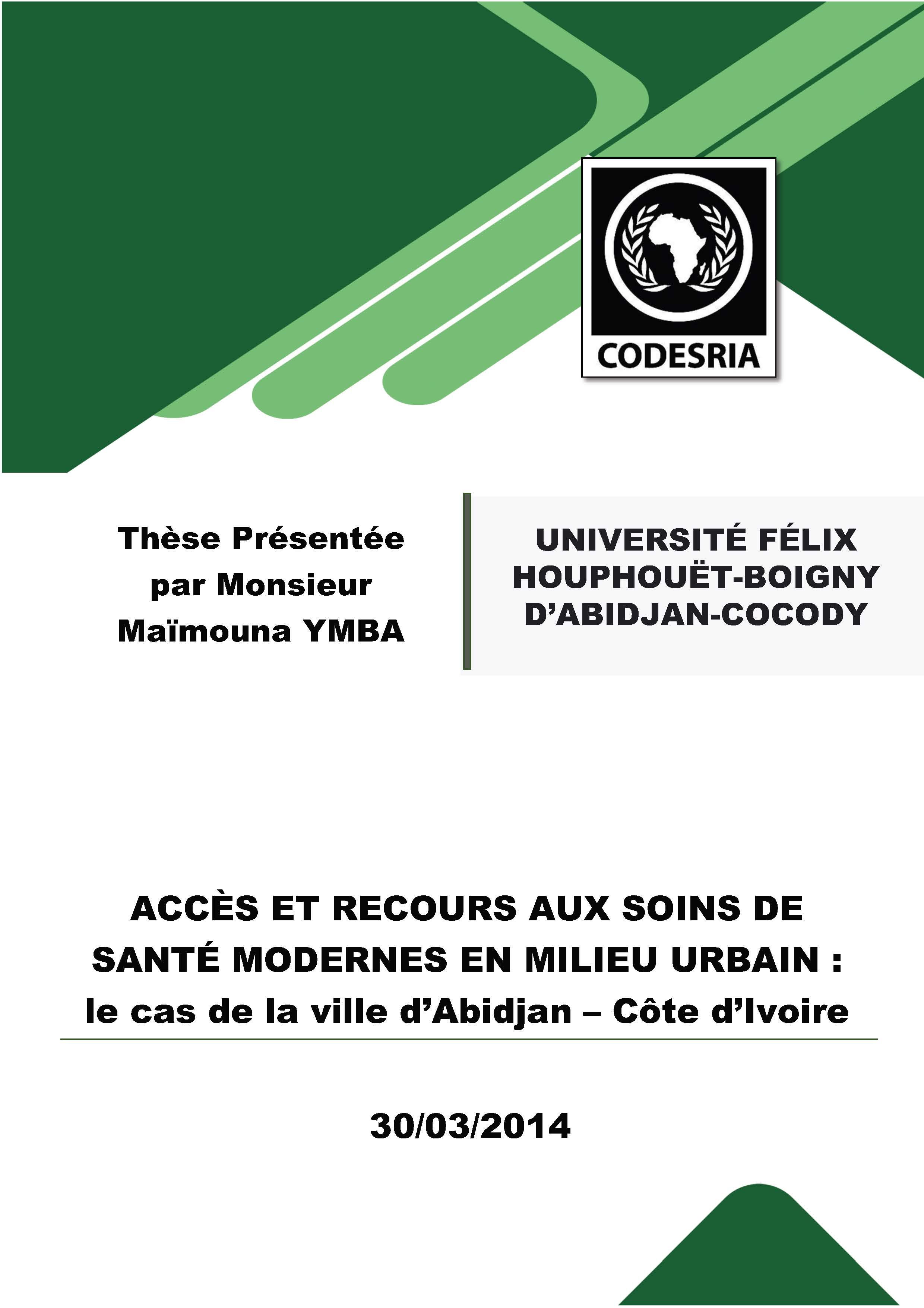ACCÈS ET RECOURS AUX SOINS DE SANTÉ MODERNES EN MILIEU URBAIN : le cas de la ville d’Abidjan – Côte d’Ivoire
Keywords:
Spatial and demographic growth, Health care supply, Access to health care, Health care seeking, Activity of the health care system, health care needs, Needs in care of health, Inequality of access health care, Illness-related behaviourSynopsis
The city of Abidjan is located in the South of the Ivory Coast. It is the economic capital since 1983 and the first city of the
country. It concentrates human potential and health of dense care supply modern and diversified divided on weak physical
distance, giving the impression that everything is approachable. In effect, the State of the Ivory Coast approved important
investments to construct and equip services of health care since the emergence of the city at the beginning of last century to
improve the access to health care of abidjanais. However, in spite of a considerable increase among health facilities and among
their availability, the rates of uses and company of the services of modern health care in the spaces of the city of Abidjan remain weak and the indicators of health remain very worrying and the needs in care of health are important. On top of that, the space and demographic speeded up growth which knows the city draw away quick changes in her territorial organization preventing the public authorities made responsible with planning for following the rhythm of its urban growth. They did not always manage to equip new urban spaces with timely urban services and to integrate new citizens at the various origins.
This thesis allows to be studying, how, in a considered context as privileged, settle the problems of access and health care seeking in the services of modern health. To accomplish this plan, this study, from the combination of spatial analysis, statistics, and field work, analyses the socio- spatial inequality of access to the services of health to head with the problem of accessibility in care, so physical, cultural, material that social. It also measures the adequacy of health care supply at the needs in care of health of populations to identify zones and populations discriminated for the access to health care. And finally, this study analyses the city practices in the use of health care, as well as the determinants that hinder or facilitate access to health care in the city of Abidjan.
Study results show that the services of health exist, they are dense and manifold, but they did not leave again where there are most needs in care of health. In our study, they also underline a predominance of the taking care at home of morbid episodes notably across self-medication and a reduction of the use of the services of modern care. The seeking in structures of health care becomes rare in the space where the needs in care of health are the most important. Self-medication or street medicine are the most favouring in general. Structures of health care are solicited that when illness becomes very serious. Our results also show that it is difficult to allocate to a factor the role determining therapeutic seeking, because behaviours are determined at the same time by the socio-demographic characteristics of the individual, his family and by contextual parameters, but also by the characteristics of morbid episode, by the knowledge of the ambient the health care system and attitudes in relation to the health care system.
However, we can say that in Abidjan, the city practices of health care seeking are depend on the economic capacity of household with risk augmented to marginalize the most vulnerable persons.
Downloads
References
ABAULETH R., KOUAKOU P., KOFFI A., 2007, “La consultation prénatale, analyse de 332 carnets à la maternité du CHU de Cocody”, Médecine Afrique Noire, 54(4) : 226-230.
ADAY L., ANDERSEN R., 1974, “A framework for the study of access to medical care”, health Services Research, 208-219.
ADAY L., ANDERSEN R., FLEMING G., 1980, Health care in the U.S: equitable for whom ?, Beverly Hills : Sage Publication.
ADAY L., BEGLEY C., LAIRSON D., SLATER C., 1998, “A framework for assessing the effectiveness, efficiency, and equity of behavioral healthcare”, The American Journal of Managed Care, 5 : 25-44.
ADJAMAGBO A., GUILLAUME A., KOFFI N., (eds.), 1999, Santé de la mère et de l'enfant : exemples africains, Paris : IRD, 165p.
AKHTAR R., 1987, Heath disease in tropical Africa: geographical and medical viewpoints, Hardwood academic publishers, 520p.
AKHTAR R., IZHAR N., 1994, “Spatial inequalities and historical evolution in health provision: Indian and Zambian examples”, in : PHILLIPS D. and VERHASSELT Y. (eds.), Health and development : 216-233, London, New York : Rout ledge, 331p.
ALLONIER C., DEBRAND T., LUCAS-GABRIELLI V., AURELIE-PIERRE., 2007, “Des indicateurs de santé moins favorables pour les habitants des zones urbaines sensibles”, Bulletin d’information en économie de la santé, 17 : 6.
AMAT-ROZE J-M., BUISSON J., GINOT L., [et al], 1994, “Les systèmes de recours aux soins à la plaine Saint-Denis : étude géographique à l’échelle locale”, Cahiers GEOS, 29 : 1-50.
AMAT-ROZE J-M., 2003, “La santé en Afrique, un continent, deux mondes”, in LESOURD M. (coord.), Afrique, Vulnérabilités et Défis, Éditions du Temps, 22p.
ANDERSEN R., NEWMAN J., 1972, Societal and individual determinants of medical care utilization in United States, Milbank Memorial Find Waterly : 95-124.
ANDERSEN R., 1995, “Revisiting the behavioural model and access to medical care: Does it matter ?”, Journal of health and social behaviour, 36 (1): 1-10.
ANNIS S., 1981, “Physical access and utilization of health services in rural Guatemala”, Social Science and Medicine, 15D (4) : 515-523.
ANTOINE P., DITTEN A., HENRY C., 1983, Abidjan une population qui double tous les 7 ans, ORSTOM, Abidjan, 37-61.
AUDIBERT M., ROODENBEKE E., 2005, Utilisation des services de santé de premier niveau au Mali : Analyse de la situation et perspectives, Région Afrique/Banque mondiale, 128p.
AUTHIER J., 2001, “Les rapports au quartier”, in Authier J. (éds.), Du domicile à la ville, Vivre en quartier ancien, Paris-Anthropos, 133-169.






